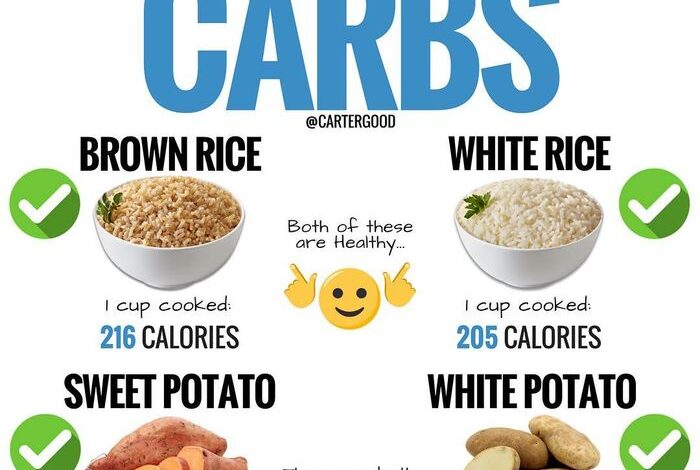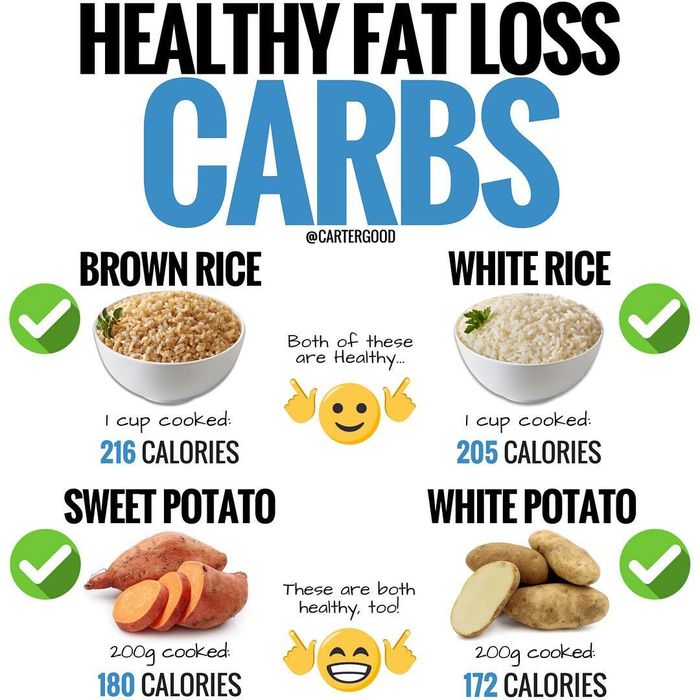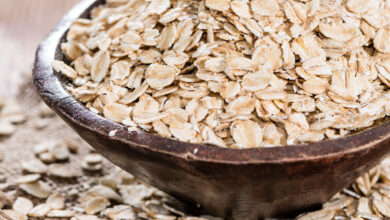
Is Cutting Carbs the Key to Losing Weight?
Is cutting carbs the key to losing weight? It’s a question that has sparked countless debates and fueled countless diet trends. The idea of limiting carbohydrates, those sugary starches that fuel our bodies, seems like a simple solution to shedding pounds.
But is it really that straightforward? This post dives into the science behind carbs and weight loss, exploring the potential benefits and drawbacks of a low-carb lifestyle.
We’ll examine how carbohydrates impact our blood sugar levels and insulin response, and how this interplay affects fat storage. We’ll also delve into the different types of carbs and their unique effects on weight management. And of course, we’ll address the potential downsides of extreme carb restriction, such as nutrient deficiencies and potential impacts on athletic performance.
Ultimately, we aim to provide you with the knowledge you need to make informed decisions about your own diet and weight loss journey.
The Science Behind Carbs and Weight Loss
Understanding the role of carbohydrates in weight loss requires delving into their impact on blood sugar levels and insulin response. This knowledge is crucial for making informed choices about carbohydrate intake and managing weight effectively.
It’s a common misconception that simply cutting carbs is the magic bullet to weight loss. While reducing processed carbs and sugary drinks is a good start, a balanced approach is key. And speaking of healthy choices, have you ever wondered if is fake meat healthier than the real thing ?
Ultimately, focusing on whole foods, regular exercise, and mindful eating habits are more important than any single dietary restriction for sustainable weight management.
Carbohydrates and Blood Sugar
Carbohydrates are broken down into glucose, which enters the bloodstream, raising blood sugar levels. This triggers the release of insulin, a hormone that helps cells absorb glucose for energy. The body’s response to carbohydrate intake is crucial for weight management.
Insulin’s Role in Fat Storage
Insulin is a key player in fat storage. When blood sugar levels rise, insulin signals the body to store excess glucose as glycogen in the liver and muscles. However, if these storage areas become full, insulin promotes the conversion of excess glucose into fat, leading to weight gain.
While cutting carbs can be a part of a weight loss strategy, it’s not the only key. Finding delicious and satisfying ways to incorporate nutrient-rich foods is essential, and chickpeas are a fantastic option! Check out delicious ways to use chickpeas under 360 calories for some inspiration.
Remember, a balanced approach with plenty of protein, fiber, and healthy fats is crucial for long-term success and sustainable weight management.
Different Types of Carbohydrates and Weight Loss
Not all carbohydrates are created equal. The impact of carbohydrates on weight loss depends on their type and how they affect blood sugar levels and insulin response.
While cutting carbs might seem like a quick fix, it’s not a sustainable solution for long-term weight loss. Instead, focus on a balanced approach that includes whole foods and regular exercise. Check out these 4 sustainable ways to lose weight without fad diets for a healthier and more fulfilling approach to weight management.
Ultimately, sustainable weight loss is about making gradual changes that fit your lifestyle, rather than drastic restrictions that are hard to maintain.
- Simple carbohydrates, such as sugar and refined grains, are quickly digested and cause a rapid spike in blood sugar levels. This triggers a large insulin release, leading to increased fat storage and potentially contributing to weight gain.
- Complex carbohydrates, such as whole grains, legumes, and vegetables, are digested more slowly and cause a gradual rise in blood sugar levels. This results in a more moderate insulin response, promoting better blood sugar control and potentially aiding weight management.
Research on Carbohydrates and Weight Management
Numerous studies have investigated the relationship between carbohydrate intake and weight loss. Research suggests that:
- Low-carbohydrate diets, which restrict carbohydrate intake, have been shown to be effective for short-term weight loss. These diets often lead to a reduction in appetite and a shift in metabolism, favoring fat burning.
- Moderate carbohydrate intake, combined with a healthy diet and regular exercise, can also support weight loss. This approach focuses on choosing complex carbohydrates and limiting simple carbohydrates to maintain balanced blood sugar levels.
- High-carbohydrate diets, particularly those rich in simple carbohydrates, have been associated with weight gain. These diets can lead to frequent blood sugar spikes and increased insulin production, promoting fat storage.
It’s important to note that individual responses to different diets can vary. What works for one person may not work for another. Consulting a healthcare professional or registered dietitian is recommended for personalized guidance on weight management and carbohydrate intake.
The Potential Drawbacks of Cutting Carbs

While cutting carbs can be an effective way to lose weight for some, it’s crucial to acknowledge the potential drawbacks associated with extreme carb restriction. It’s not a one-size-fits-all approach, and understanding the risks is essential before embarking on such a diet.
Nutrient Deficiencies, Is cutting carbs the key to losing weight
Restricting carbohydrates can lead to nutrient deficiencies. Carbohydrates are a primary source of essential vitamins and minerals, particularly B vitamins, fiber, and magnesium. A diet severely lacking in carbohydrates can result in:
- Vitamin B Deficiency:B vitamins are crucial for energy production, cell growth, and nervous system function. A lack of B vitamins can lead to fatigue, anemia, and nerve damage.
- Fiber Deficiency:Fiber is essential for digestive health, regulating bowel movements, and promoting satiety. A low-fiber diet can contribute to constipation, bloating, and increased risk of digestive issues.
- Magnesium Deficiency:Magnesium plays a vital role in over 300 bodily processes, including muscle function, blood sugar control, and blood pressure regulation. A deficiency can result in fatigue, muscle cramps, and headaches.
Fatigue and Reduced Energy Levels
Carbohydrates are the body’s preferred source of energy. When you drastically cut carbs, your body enters a state of ketosis, where it starts burning fat for fuel. This process can lead to fatigue, especially during the initial phase of adaptation.
“The body needs carbohydrates to function optimally, and a sudden drastic reduction can lead to a decrease in energy levels, making it difficult to perform daily activities and exercise.”
Negative Impacts on Athletic Performance
For athletes and physically active individuals, restricting carbohydrates can negatively impact performance. Carbohydrates provide the energy needed for high-intensity exercise and muscle recovery.
- Reduced Muscle Glycogen Stores:Muscle glycogen is the primary fuel source for intense exercise. A low-carb diet depletes glycogen stores, leading to decreased endurance and strength.
- Increased Fatigue and Muscle Soreness:The body may rely on fat for fuel, which can be less efficient than carbohydrates, leading to increased fatigue and muscle soreness.
- Impaired Cognitive Function:Carbohydrates are essential for brain function. A low-carb diet can lead to brain fog, difficulty concentrating, and impaired decision-making, negatively affecting athletic performance.
Long-Term Effects of Very Low-Carb Diets
While short-term weight loss may be achievable with a very low-carb diet, long-term adherence can be challenging and potentially harmful.
- Increased Risk of Heart Disease:Some studies have linked very low-carb diets to increased LDL cholesterol levels, which can increase the risk of heart disease.
- Nutrient Deficiencies:As mentioned earlier, long-term carb restriction can lead to significant nutrient deficiencies, impacting overall health.
- Metabolic Changes:Very low-carb diets can alter metabolism, leading to hormonal imbalances and potential metabolic issues in the long run.
Final Review: Is Cutting Carbs The Key To Losing Weight

So, is cutting carbs the key to losing weight? The answer, as with many things in the realm of health and wellness, is not a simple yes or no. While reducing carbohydrate intake can be a valuable strategy for some, it’s not a one-size-fits-all solution.
The key lies in finding a balanced approach that aligns with your individual needs, goals, and lifestyle. Remember, sustainable weight loss is about making long-term changes that support both physical and mental well-being. By understanding the science behind carbs and weight loss, you can make informed choices that empower you to achieve your health goals.






